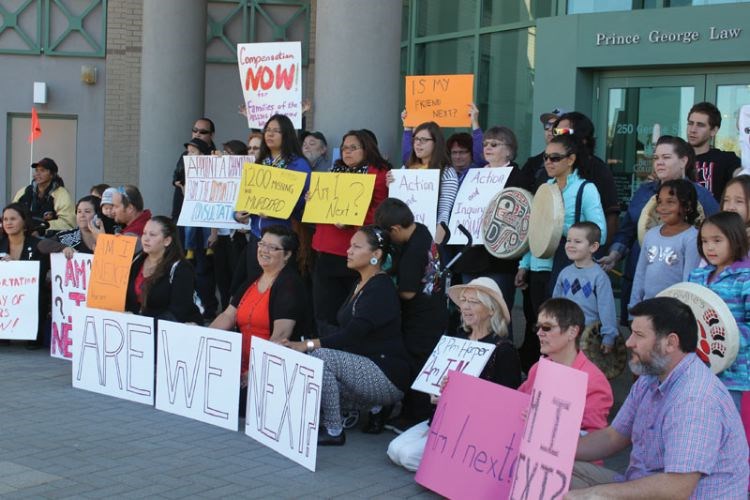It's not enough to call for a national inquiry into the missing and murdered aboriginal women, said Jessie King. There needs to be action at the same time.
King, a UNBC PhD student, spearheaded a local rally Sunday morning in support of the #AmINext campaign. The social media movement was started by Holly Jarrett in Ontario. Jarrett is the cousin of Loretta Saunders, an Inuit woman from Labrador who was found dead in New Brunswick two weeks after she was reported missing from her Halifax apartment in February.
Saunders's story hit close to home for King, who - like Saunders - was pregnant when she disappeared. Like King, Saunders was also a student, doing work on missing and murdered aboriginal women.
"I was very personally affected by it," said King, who put out the call on Facebook and UNBC networks last week about the event held on the courthouse steps. "I knew I had to step up and do something."
As part of the #AmINext campaign, women are encouraged to post photos of themselves holding signs asking "Am I next?" - as in will they be the next person to go missing or be killed before a public inquiry is called into the more than 1,100 documented cases.
"We need to know why it that Aboriginal girls and women like Loretta are five to seven times more likely to die as a result of violence than non-Aboriginal women," said Jarrett in her www.change.org petition that has already collected more than 323,600 signatures.
A national public inquiry is a crucial step, according to the Native Women's Association of Canada.
An inquiry would "increase public awareness of this human rights crisis in Canada and provide assurance to Aboriginal peoples that all levels of government recognize the severity of the issue and are committed to ending these cycles of violence," states a document posted to the group's website about the issue.
But an inquiry wouldn't be enough, said King. There would need to be something tangible happening alongside it, such as extending community centres or creating a rural-to-urban bus line.
Chereen Patrick came from Burns Lake with her family to attend the rally. Patrick is no stranger to the cause, with her own cousin - 16-year-old Ramona Wilson - among those who disappeared in 1994 from her hometown of Smithers only to be found dead 10 months later.
"It's critical we unite in this time and shine a light on the issue by coming together," said Patrick.
Since the government doesn't seem to be taking a lead, it's up to others to pick up the slack, said Ron Charlie.
"Grassroots people are standing up and saying 'enough's enough,'" he said.
Henry Morgan, who works with vulnerable members of the population at a needle exchange, said he worked with three out of the four women Cody Legebokoff was convicted of murdering last week.
His presence at Sunday's event was to not only support the cause, but also to take as stand for his own children.
"I don't want them to be part of statistics," Morgan said, noting there are less and less resources available for outreach. "The shelters are overloaded, there are still women I work with that sleep on the street."



